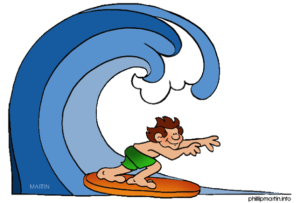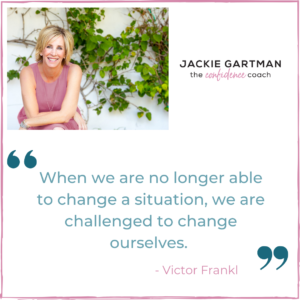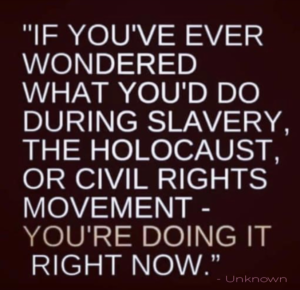
Two years ago, my husband and I had to put our beloved dog to sleep after a long illness. I was devastated. I remember sitting at my desk one day, trying to get some work done,when a wave of sadness came over me. During the prolonged snot-crying episode that ensued, I was dimly aware that I was standing outside my body, witnessing it. Worse, I was judging my grief, and in doing so, resisting it.
The soundtrack in my head sounded something like this:
- I can’t handle this sadness
- I’m going to get so depressed I’ll never snap out of it
- What if this never ends? Stop it, just STOP IT!
As a result, my crying jag went on for well over half an hour until I was red-eyed, hiccupping, and pretty much useless for the rest of the day.
What I’ve come to learn through both my coaching practice and from coaching myself is how often we believe we’re feeling pure emotion, when what we’re actually feeling is our resistance to it. And this is precisely what keeps us stuck.
When we resist what we are feeling, we mute not just our negative emotions but our positive ones too. Furthermore, in an attempt to control our feelings, we actually amplify them, which has a domino effect of making the urge to stuff our emotions even stronger.
Imagine trying shove a beach ball under the surface of the water. Even though you might expend enormous energy trying to keep it submerged, odds are that it will simply pop up anyway, an in unexpected places and at inappropriate times. This is how people end up yelling at a waiter when they’re actually very much trying not to feel how much they hate their job. This is why someone who hasn’t grieved the loss of a relationship fully and completely can end up in wracking sobs in the vegetable aisle over the price of avocados. (Yes, they can be very expensive, but they are also very delicious. I do understand.)
Quite simply, resisting our feelings causes more prolonged emotional pain.
Jill Bolte Taylor, neuroscientist and author of My Stroke of Insight (if you haven’t read it, you must!), says this about processing emotions:
“When a person has a reaction to something in their environment, there’s a 90-second chemical process that happens in the body; after that, any remaining emotional response is just the person choosing to stay in that emotional loop.”
This means that in just a minute and a half, an emotional state has a beginning, a middle, and, if you let it, an end. Note: this doesn’t mean you’ll never feel this emotion again. It just means that this particular episode has been felt, honored, and released.
So that’s exactly what I did the next time I got hit by a wave of doggie sadness. Instead of playing my endless loop about how I shouldn’t be feeling this way or how much I didn’t want to be feeling this way, I dove from my judge-y little brain straight back into my body and just sat with my grief. My sadness didn’t even last 90 seconds. More importantly to me, the earth did not shatter, and I did not go up in a puff of smoke.
Want to give this a try? Follow these steps and see what happens.
- First, bring a situation that’s upsetting you to the forefront of your mind.
- Notice any sensations you feel in your body as you think and reflect on this situation (tension in your neck/shoulders, tight throat, aching solar plexus, etc.).
- Identify the emotion(s) you associate with those sensations (think mad, sad, disappointed, worried, etc.).
- As counterintuitive as it may feel, sit with and lean into those feelings and see if you can make them bigger – really exaggerate them.
- If you feel any resistance to making your emotions bigger, notice if you have a “resistance” soundtrack playing in the back of your mind. If you do, simply notice those thoughts and repeat, “I notice I’m thinking that I shouldn’t be feeling this way, I notice I’m thinking that these feelings will never go away, I notice I’m thinking I can’t handle this.” Allow these thoughts to be without having to get hooked by them.
- Go back to leaning into those emotions. Just allow them to be there.
If you genuinely allowed yourself to feel your feelings, you probably noticed a few things.
Like an ocean wave, the feelings came, but then dissipated.
When you made those feeling bigger initially, they probably became smaller in the end.
You feel more, rather then less in control of your feelings.
When feeling your feelings, the best thing you can do for yourself is trust that you can handle it—no matter what. I know you can. Why? Because I’ve been there. I’ve ridden those waves, and I lived to tell the tale.
I’m still here. You will be, too.




